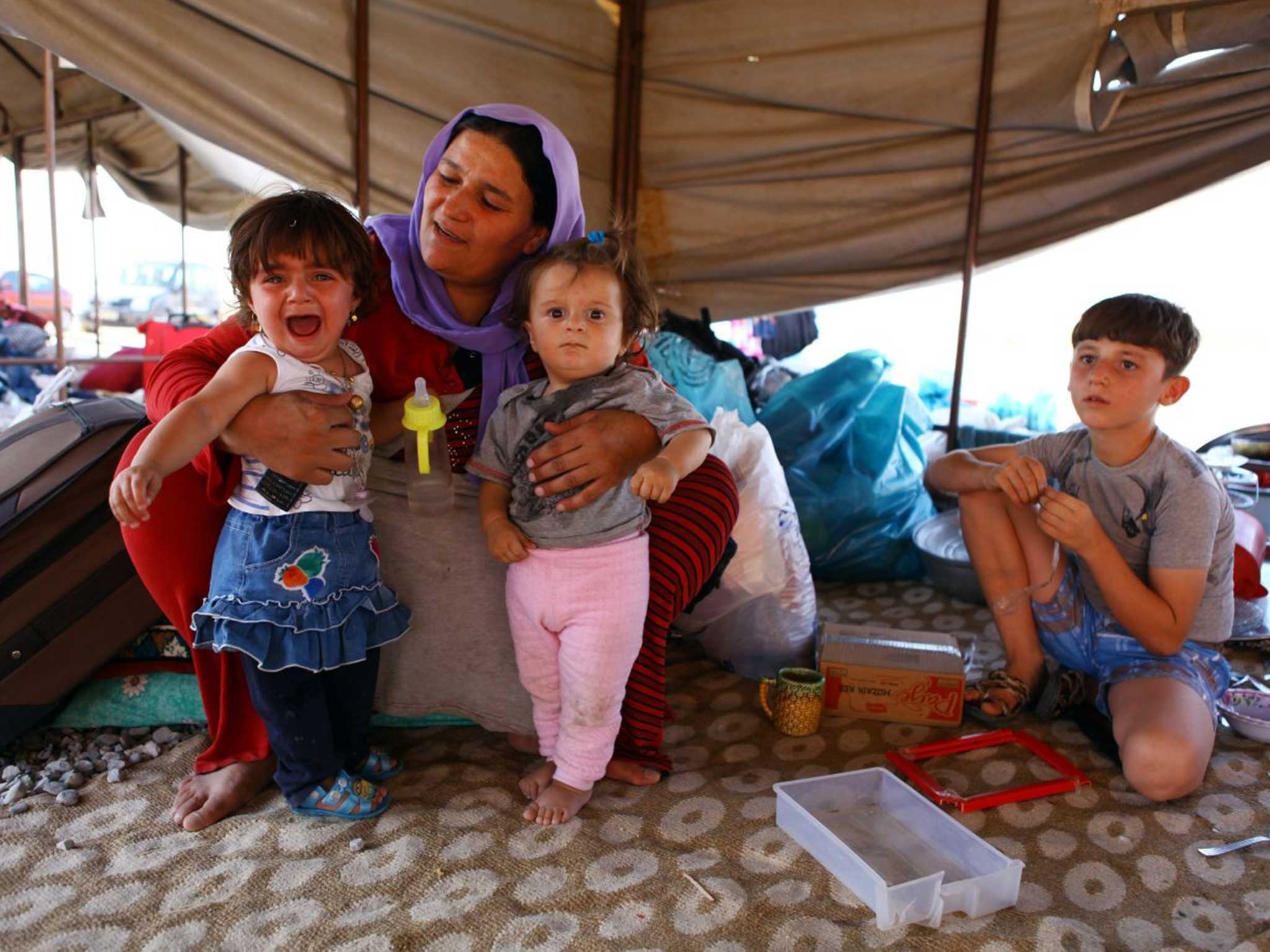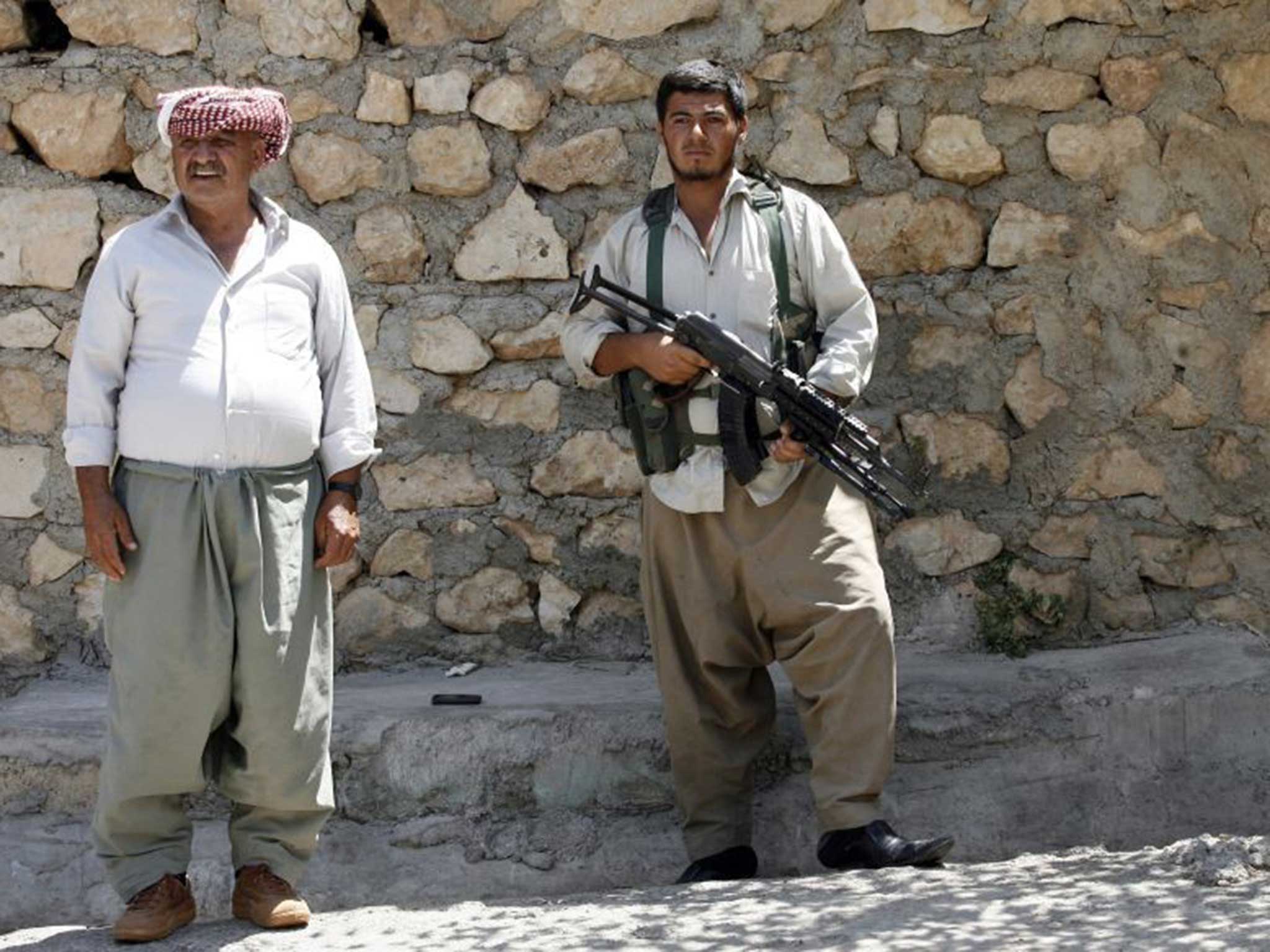Iraq crisis: Starving, desperate, but safe from Isis on Mount Sinjar
Stranded on a mountain, reliant on aid drops, Iraq's Yazidis and Christians have been left with nothing

Mount Sinjar rises from a vast expanse of the barren border region of northern Iraq: a near vertical ridge reaching a rocky plateau of baked earth and jagged rocks. Small groups of men, women, and overwhelmingly children, wave at the sky as a Kurdish helicopter carrying food and water descends, throwing up clouds of dust. As the helicopter lands, a crowd appears on the horizon. A human train of the Yazidi of Sinjar province – persecuted in today's Iraq controlled by the Islamic State of Iraq and the Levant (Isis) – together with Christians of Mosul and Qaraqosh.
Convert or die is the ultimatum issued by Isis to other religions. Those stranded atop Mount Sinjar are those that fled before being killed, now stranded as fighting intensifies in the mountain range that separates Kurdish-controlled Iraq from the Isis advance. Isis considers the Yazidis apostates and has vowed to exterminate them.
A crush forms. Hundreds are desperate for sustenance, arms raised for a small bottle of water, a bag of flour. A man points towards his child, who is crying, asking for more food. The boy is soon lost in the throng.
Of the tens of thousands of Yazidis stranded on the mountain top, only 20 manage to squeeze into the Kurdish helicopter. On board, a woman with her eyes barely open cradles her child; a young man weeps – they all attempt to eat what is offered, a dry biscuit. They pray quietly as they protect their ears from the roar of the rising helicopter.

The thousands of Yazidis had spent a week on the mountain, reliant on aid deliveries and air drops from the West. Yesterday, many were reported to have sought refuge in another country ravaged by conflict, Syria.
Some managed to collect water and food, dropped overnight by US planes, before heading north-west on a 12-mile walk across mountains and desert to the Syrian border. Another US aid drop yesterday included more than 28,000 meals and more than 1,500 gallons of water.
At the border, Syrian Kurdish forces waited to transport them to refugee camps or to safe crossings back into the Kurdish region of Iraq. Many of those taken to safety came from hideouts near the mountain, few from its summit.
As few as one-in-ten of those on the mountain managed to leave, said Serbast Babili, the commander with Iraqi Kurdish forces overseeing the evacuation as Kurds fought running battles against Isis near the Sinjar village of Sinoon.
Saleh Mehdi Abbas, 31, said his family was one of around 300 trekking toward the Syrian border on Friday. He had left his area of the mountain at 3am then walked for about an hour to pick up food and water in an area where US planes made food drops overnight, before moving on. "We can't go much longer," he said.
There were conflicting reports about whether the Kurdish forces co-ordinating the evacuation were allowing men of fighting age to leave the mountain. Ziad Qasim, 27, whose family was about a mile from the start of the evacuation route, said he had been told by a militiaman that whoever could carry weapons had to stay to fight.
"My wife and my father say they won't leave without me," he told The Washington Post by telephone. "What are we going to do?"
Even as the evacuations continued yesterday, reports said hundreds of Yazidi women had been captured by Isis militants.
Kamil Amin, the spokesman for Iraq's Human Rights Ministry, said Yazidi women below the age of 35 were being held in schools in Iraq's second-largest city, Mosul. He said the ministry learned of the captives from their families. "We think that the terrorists by now consider them slaves and they have vicious plans for them," Mr Amin told the Associated Press. "We think that these women are going to be used in demeaning ways by those terrorists to satisfy their animalistic urges in a way that contradicts all the human and Islamic values."
Welid Ömer, from Sinjar's Xana Sor village, was one of those to join the Kurdish forces, the Firat News Agency reported yesterday. "Our children died of thirst on Mount Sinjar, our people can't find a slice of bread to eat," he said. "I am going to fight for those people. We are going to liberate Sinjar and bring our people back to our city."
Join our commenting forum
Join thought-provoking conversations, follow other Independent readers and see their replies
Comments
Bookmark popover
Removed from bookmarks